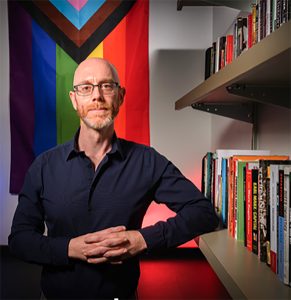Study finds LGBTQ+ people report more police verbal abuse, mistreatment
By Sharita Forrest University of Illinois News Bureau — June 19, 2024
University of Illinois Urbana-Champaign sociology professor Stefan Vogler reports that LGBTQ+ individuals reported higher levels of verbal abuse from police and other forms of mistreatment compared with heterosexual people. (Photo by Fred Zwicky / University of Illinois)
Despite improvements in relations between police and LGBTQ+ communities, higher levels of verbal abuse and mistreatment are being reported, according to a new study.
Stefan Vogler, a professor of sociology at the University of Illinois Urbana-Champaign, is a co-author of a new American Civil Liberties Union report, “Policing Progress: Findings from a National Survey of LGBTQ+ People’s Experience with Law Enforcement.”
What was the impetus for this report? We wanted to do this report and the whole Policing the Rainbow Project — a landmark study of LGBTQ+-police relations — because we felt that LGBTQ+ people, gender, and sexuality more broadly were missing from the national conversation on policing. That was important because there’s a long history of a contentious relationship between LGBTQ+ people and the police. If we go back to the early or the mid-20th century, there were routinely raids on gay bars and places where gay people congregated; laws against cross-dressing or wearing clothes of the, quote-unquote, opposite sex; as well as prohibitions on gay people gathering in public places together, touching or dancing together. The 1969 Stonewall uprisings were in direct response to police violence against the LGBTQ+ community. Police departments recognized this and tried to improve relationships with the LGBTQ+ community through various avenues — creating sensitivity trainings, and LGBTQ+ liaison officer positions and doing more outreach with the LGBTQ+ communities. But based on the existing research on LGBTQ+-police relations, it seems as though they still are very much at odds with each other. When we think about policing, race has been central, as it should be, but there are many ways that gender, sexuality and LGBTQ+ identities come into play in policing. We wanted to see what was really going on from a holistic social science perspective.
In what ways do the experiences of LGBTQ+ people with the police differ from those of heterosexual individuals? LGBTQ+ people have more contact with the police, whether that’s requesting aid, reporting something or having involuntary, police-initiated contact. They are more likely to be stopped by the police, to be searched, arrested or held in custody. All these forms of police contact are more common among LGBTQ+ people than non-LGBTQ+ people. This is especially true for transgender people. Nearly a third had police-initiated contact in the past 12 months compared with only 14.6 percent of non-LGBTQ+ people. The content of these experiences and interactions differs as well. LGBTQ+ people are more likely to have physical force and insulting language used against them by the police, although this varies by sexual and gender identity. Whereas 12.3 percent of lesbian and gay respondents reported police using insulting language, more than 25.4 percent of bisexual people and 26.8 percent of queer+ respondents reported it. Rates were even higher among transgender (44.9 percent) and nonbinary+ (33.1 percent) individuals.These differences are even starker when we consider race and socioeconomic status. LGBTQ+ people of color and of low socioeconomic status have even higher rates of contact with and mistreatment by the police in almost all the measures that we looked at. Unsurprisingly, LGBTQ+ people are less likely to find their interactions with the police to be fair and just. They perceive the police as a less-effective institution than non-LGBTQ+ people do. And as a result, they’re ultimately less willing to contact the police in the future than non-LGBTQ+ people.
What would you most like people to draw from this research? At the broadest level, I would like people to understand that gender and sexuality are important social factors in policing and in determining how people are treated by the police and the broader criminal-legal system. LGBTQ+ and gender identity are important things to consider when we think about policing in America. The LGBTQ+ community is a remarkably diverse community, and we’re affected by policing differently along these various axes of social differentiation, whether that’s gender or sexual identity, race, socioeconomic status, immigration status or other characteristics.







